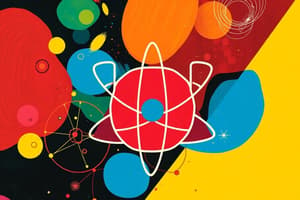Podcast
Questions and Answers
Who were some of the Renaissance figures that made monumental contributions to our current view of the cosmos?
Who were some of the Renaissance figures that made monumental contributions to our current view of the cosmos?
Copernicus, Galileo, Kepler, Newton
What is Darwin's theory that explains how species evolve over time?
What is Darwin's theory that explains how species evolve over time?
Evolution by natural selection
Name a key area of science that faces challenges today related to global warming and environmental issues.
Name a key area of science that faces challenges today related to global warming and environmental issues.
Climate change
Why is improving public literacy regarding scientific concepts important?
Why is improving public literacy regarding scientific concepts important?
What are some areas where society can focus on to tackle global challenges effectively?
What are some areas where society can focus on to tackle global challenges effectively?
What is a significant milestone in space exploration that involved landing humans on the moon?
What is a significant milestone in space exploration that involved landing humans on the moon?
What is the primary goal of science?
What is the primary goal of science?
Name three disciplines that fall under the umbrella of science.
Name three disciplines that fall under the umbrella of science.
What are some core principles that unite all scientific fields?
What are some core principles that unite all scientific fields?
What are some common methods used in scientific inquiry?
What are some common methods used in scientific inquiry?
How has technology impacted scientific investigation?
How has technology impacted scientific investigation?
Why is open communication important in the scientific community?
Why is open communication important in the scientific community?
Flashcards are hidden until you start studying
Study Notes
Discovering Our World Through Science
Science is more than just a collection of facts; it's a journey of discovery filled with curiosity, experimentation, and wonder about our universe. Scientific knowledge has expanded across a myriad of fields over centuries, allowing us to comprehend complex systems and unlock the secrets of nature. Let's delve into some fundamental components of science and its diverse branches.
Defining Science
Science refers to the pursuit of understanding the natural world through systematic observation, measurement, experimentation, and reasoning. It encompasses many disciplines like physics, chemistry, biology, computer science, mathematics, astronomy, geosciences, psychology, and environmental sciences.
Core Principles of Science
Regardless of specific scientific field, common principles unite them all. These foundational tenets include evidence-based reasoning, skepticism towards claims without empirical support, replication of experiments, peer review, and open communication to share results and collaborate.
Methods of Inquiry
Scientists employ various methods to test their hypotheses and generate new theories. Common techniques used throughout scientific investigation include controlled observations, experimental design, data analysis, statistical testing, and mathematical modeling. As technology advances, so do these tools and approaches, providing scientists with increasingly powerful ways to explore the unknown.
History of Science
The development of modern scientific thought can trace back thousands of years. Ancient Greek philosophers laid the groundwork, while later Renaissance figures such as Copernicus, Galileo, Kepler, and Newton made monumental contributions to our current view of the cosmos and physical laws governing our world. Since then, other notable milestones have included Darwin's theory of evolution by natural selection, Einstein's theory of relativity, quantum mechanics, genetics, and space exploration like landing humans on the moon.
Challenges Facing Science Today
Although we've gained immense knowledge, some critical issues remain unsolved, including climate change, energy production, conservation efforts, disease prevention, and artificial intelligence ethics. Additionally, improving public literacy regarding scientific concepts is essential for informed decision making and ensuring the future success of humanity.
In conclusion, science provides humankind with endless opportunities to understand our planet and expand our horizons. By embracing scientific methodologies, nurturing collaboration among researchers worldwide, and promoting scientific education, society stands poised to tackle global challenges and achieve unprecedented breakthroughs benefiting generations to come.
Studying That Suits You
Use AI to generate personalized quizzes and flashcards to suit your learning preferences.




